Below are the full success and client stories from the Warren County Elderly Services Program (ESP) 2021 Annual Report. These stories illustrate the impact ESP has on older adults and caregivers in Warren County.
Click here to view the program’s 2021 annual report. To request a paper copy, email us.
ESP helps Warren County woman live independently, despite health challenges
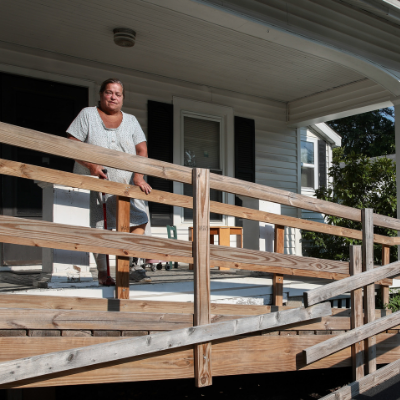
Rebecca, 64, is a private, independent woman who draws on her strength each and every day.
Growing up in Lebanon, she is used to the quiet streets that surround her home of 13 years. It’s filled with photos – faces of her family smile at her as she watches TV on her couch. Her son’s picture hangs in a prominent location where she can always see it.
The Warren County Elderly Services program (ESP) has been a strong partner for Rebecca, lending her a hand and offering peace of mind. Rebecca’s health challenges began 15 years ago with an infection in her left foot, leading to the amputation of her left leg 10 years later.
“I see things differently,” she says, referring to living with a disability. “I pay attention to the weather, to how I’m going to get from here to there, how I’m going to open doors.”
ESP installed a ramp outside her home to replace the steps which were difficult for her to navigate, and provides an Emergency Response system which – thankfully – she has not needed to use. “I do test it periodically,” she said. “I just press the button, it sets the alarm off and a voice talks to me.”
ESP also provides services that help her live her life to the fullest. The middle of the week is especially busy for Rebecca when, on Tuesdays, her home health aide, Diane, helps around the house doing laundry and sweeping.
On Wednesdays, her home-delivered meals arrive. “I cook very little these days,” she said. “It’s just me, and it’s tough cooking for one. I really do like the crab cakes they have.”
New financial management services provider makes it easier for ESP clients to hire their own caregiver
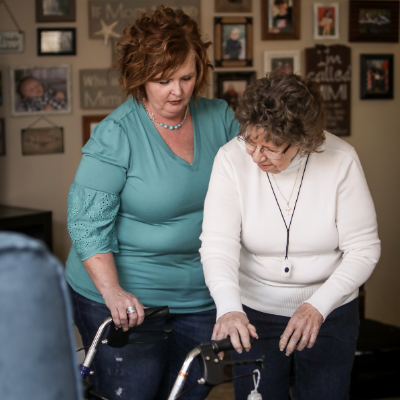
As ESP’s administrator, COA contracts with organizations to deliver services to clients. Contracts are awarded through a competitive bidding process via requests for proposals (RFPs). The goal of the RFP process is to identify and contract with service providers who can offer the highest quality services at the lowest possible cost in order to serve as many older adults as possible with the available tax dollars.
In September, COA issued an RFP for Financial Management Services (FMS) in the Elderly Services Program. The FMS provider supports ESP clients who utilize the program’s consumer-directed care option to recruit and hire their own aides. In this case the ESP client or designated family member is the “employer” and the aide they hire is their “employee.” The FMS provider, on the client’s behalf, manages all the financial and payroll related responsibilities in addition to criminal background checks that go along with being an “employer.”
COA received six proposals in response to the RFP. After all bids were scored, Palco, Inc. was selected as the new FMS provider. The new contract took effect in January 2022 and the process of transitioning current consumer-directed care clients is now underway.
“The new contract with Palco could not have come at a better time,” said Ken Wilson, COA’s vice president of program operations. “There is a severe shortage of home health aides which is impacting ESP’s ability to match clients with home health aides through traditional avenues such as home care agencies. The FMS provider is a key partner in helping us expand the consumer-directed care option of ESP, enabling older adults to work outside of those traditional sources to hire their own aides or caregivers.”
Wilson added that Palco has a history of working with older adults who use programs like ESP to hire their own aides. He said with the transition to Palco, clients who hire their own caregiver can expect a faster enrollment process with expert customer support. “Ultimately, this means we’ll be able to expand the consumer-directed care service to more older adults,” Wilson said.
Council on Aging helps older adults get COVID-19 vaccinations
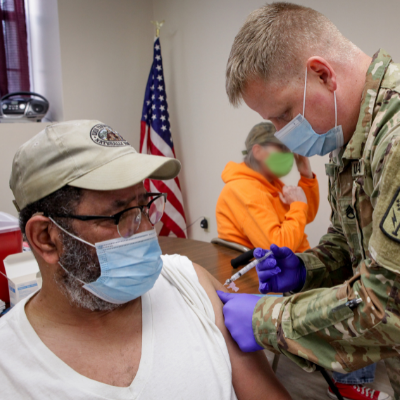
Since February 2021, Council on Aging (COA) has played a key role in helping more than 3,000 area older get vaccinated against COVID-19, while helping countless others connect to information about the available vaccines.
When Ohio rolled out its statewide COVID-19 vaccination plan in February 2021, older adults were among the first eligible groups to receive a vaccination. However, older adults had difficulty getting vaccinated for two primary reasons: 1) there was not enough vaccine to meet the demand; and 2) most vaccine registration systems required use of a computer or smart phone to make an appointment – a barrier for many older adults. There was also confusion about where older adults could go for assistance in navigating a fragmented vaccine system.
COA helped older adults overcome these barriers by:
- Helping older adults find vaccine providers in their community. COA staff monitored local vaccine availability and helped older adults schedule appointments or join applicable waiting lists.
- Providing no-cost, roundtrip transportation to vaccination appointments for eligible older adults.
- Assisting the Ohio National Guard with vaccination clinics at low-income senior apartment buildings in the region, including coordinating busing from nearby senior communities to maximize the number of people vaccinated at each clinic. Governor Mike DeWine and First Lady Fran DeWine attended one of these clinics and praised Area Agencies on Aging for their work in helping older adults through the pandemic.
“This is the first time COA has worked with the National Guard to vaccinate older adults in this way,” said Ken Wilson, COA’s vice president of program operations and a lead coordinator for the vaccination clinics. “There was a lot of coordination and planning that went into these clinics. It was great to see everyone working together with one goal in mind: protecting vulnerable older adults from COVID-19.”
Residents who came for vaccine appointments showed a range of emotions. Some were apprehensive about getting a new vaccine, but recognized it was their best option for getting their lives back to normal.
“I never get the flu shot,” a resident at an area senior apartment building reported, “but I thought this was important.”
In March 2021, COA began working with local health departments to vaccinate homebound older adults. For many older individuals, leaving their home to get vaccinated could result in serious physical hardship or present a danger to their health. As a result, COA advocated at the state and local level for a process to vaccinate homebound older adults.
| 2023 Update: Due to the end of the COVID-19 pandemic, COA’s Homebound Vaccination Program is no longer available. Vaccines may be available at private doctor offices, pharmacies, workplaces, community health clinics, health departments or other community locations, such as schools and religious centers. If your primary healthcare provider does not stock all the vaccines recommended for you, ask for a referral. You may also find locations providing the flu and COVID-19 vaccines in your community at www.vaccines.gov. |
“We’d been helping older adults get vaccinated since Ohio’s vaccination plan went into effect,” said Ken Wilson, COA’s vice president of program operations. “From the beginning, we worked to find a way to vaccinate older adults who could not leave their homes. Because COA provides in-home care services to homebound older adults in southwestern Ohio, we were in a good position to identify who in the community needed this service.”
COA worked with local health departments to develop a plan to vaccinate homebound older adults. Using the Centers for Disease Control and Prevention’s (CDC) guidelines for vaccinating homebound individuals and a locally-developed screening tool, COA built a list of individuals who qualify for in-home vaccination in southwestern Ohio. The list included COA clients, as well as individuals from the community not enrolled in a COA program. In all 50 Warren County older adults were referred to local health departments for in-home vaccinations.
On a weekly basis, COA provided local health departments with a list of homebound individuals in their jurisdiction. Health departments then contacted these individuals to schedule their appointment. This work continues as older adults continue to get vaccinated against COVID-19.
“Some people think because they’re homebound, they’re not high-risk, but it’s actually quite the opposite,” Wilson said. “Most homebound individuals have two or more health conditions which put them at risk for severe complications, hospitalization or even death from COVID-19. And, these individuals have people who are coming and going from their home – caregivers, home health care and others – which can increase their risk of exposure.”
COA’s efforts to help older adults get vaccinated against COVID-19 continue. A major focus at the time of this writing is booster shots. Booster shots are important because the vaccine’s effectiveness at preventing serious illness lessens over time – especially in people age 65 and older.
Links to more reading:
- COA, National Guard partner on vaccination clinics in low income senior buildings
- COA helps older adults access COVID-19 vaccine
- Town Halls to prepare buildings for vaccination clinics
- Council on Aging helping to vaccinate homebound older adults
ESP’s FastTrack Home ensures daughter is able to care for her mother at home
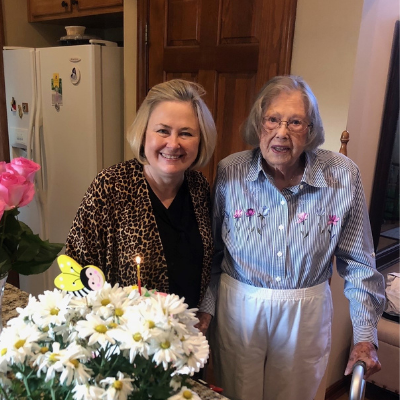
Mary, 93, had been enjoying the independent life in her condominium since 1994. She was active and could handle just about anything she needed to do to take care of herself, except for the grocery shopping. Her daughter Lisa helped with that.
But one night Mary called Lisa, reporting she wasn’t feeling well. The squad transported Mary to the hospital, where she was diagnosed with a life-threatening pulmonary embolism. What followed was time in the hospital on a ventilator, and then rehabilitation at a nursing home in Warren County, near Lisa.
While she received good care and “did well for her age,” according to Lisa, when it was time to leave the nursing home, Mary wasn’t quite ready to go back to her condo to fully recover by herself. She was at high risk for falling and still was not feeling as well as she did prior to hospitalization.
There was no question – Mary would stay with Lisa. But how would that work, given that Lisa’s home was not equipped with the safety modifications Mary needed? And although Lisa was working from home at the time due to the COVID-19 pandemic, she knew she would be going back to the office soon.
Council on Aging’s (COA) FastTrack Home program was there to help. A COA staff member met with Lisa and Mary at the nursing home to enroll Mary in the program and determine how it could give her the best chance at a successful recovery.
Lisa’s bathroom required modifications so Mary could bathe safely. And once Lisa returned to work at her office, Mary received an emergency response system she could use to call for help in case of a fall.
Lisa was pleased with the COA service providers who visited her home to install these items. “Both of the vendors have been lovely,” Lisa said. “The service felt very personal and they were pleasant and nice.”
Lisa was also very appreciative of the personal touch they received from their COA care manager, Amy. Every client receives support and coaching from a professional care manager to ensure they understand how to take their medications and how to identify “red flags” that could indicate a serious change in their condition.
“One of the things that was so helpful was the sense that you are not alone, that you are talking to someone who cares and knows a lot more than you do,” Lisa said. “As time went on, Amy would check in and send information about Mom’s options.”
Depending on the client’s needs, FastTrack Home can also provide home-delivered meals, transportation to medical appointments and other home modifications for up to 60 days for no cost. The program is a service of the Warren County Elderly Services Program, the majority of which is funded by the Warren County Senior Services Levy.
FastTrack Home’s goal is to help older adults recover successfully at home after a hospital or nursing home stay, avoiding the risk of a return to the hospital, which can be a common occurrence with older adults. It also helps primary caregivers like Lisa continue to tend to their own responsibilities while caring for their loved-one.
Mary’s hope is to return not to the hospital, but to her condo and her independence. With the help she’s received from FastTrack Home, she’s headed in the right direction.
Voters approve Warren County senior services tax levy
Older adults and caregivers in Warren County will continue to have access to the county’s Elderly Services Program (ESP) thanks to the overwhelming support of county voters on Nov. 2.
In Warren County 78 percent of voters approved Issue 2, the county’s senior services tax levy. This approval rating is a record for senior service levies in Council on Aging’s service area.
The levy provides 88 percent of funding for the county’s Elderly Services Program, which helps some 4,200 older adults receive care in their homes, instead of in a nursing home. The levy was a renewal of the existing 1.21 mill levy. It costs homeowners $29.93 annually per $100,000 in home valuation. That’s about $2.50 per month.
“Voters recognize the important role the levy plays in making the community a great place to live for people of all ages, and we appreciate their continued support,” said Ken Wilson, vice president of program operations at Council on Aging. “Senior services levies benefit everyone. They enable family caregivers to continue working, which is good for families, businesses and our economy.”
Council on Aging administers senior services tax levies in Butler, Clinton, Hamilton and Warren counties under contracts with commissioners in those counties.
Program recognized for diverting older adults from hospitals and nursing homes during the pandemic

Council on Aging (COA) received a 2021 Inspire Healthcare award from The Health Collaborative for Discharge to Home, a program developed by COA during the pandemic to provide a safe, supportive path home for older adults being discharged from area hospitals and nursing facilities, while also freeing up valuable healthcare resources.
Inspire Healthcare is the region’s premier healthcare awards event, recognizing regional heroes who are pioneering efforts in improving health and healthcare. COA was a finalist in the program’s Gen-H category, which recognizes compelling programs, policies, system-level or environmental change strategies that improve community health.
“At the start of the pandemic, older adults were getting sick and dying from COVID-19 at much higher rates than the rest of the population,” said Ken Wilson, COA’s vice president of program operations. “Discharge to Home achieved two key goals for our region: it diverted older adults away from COVID hot spots such as nursing homes and rehab facilities, and it helped preserve valuable and limited healthcare resources during peak periods of the pandemic.”
Leveraging an existing transitional care program, FastTrack Home, COA quickly developed and implemented Discharge to Home to provide a centralized process for older adults who were going home from hospitals and nursing facilities but needed supportive services for a safe and effective recovery – regardless of their COVID status.
During the first year of the pandemic, Ohioans aged 60 and older accounted for 65 percent of all COVID-19 related hospitalizations in the state (and 93 percent of deaths). At times, nursing facilities had some of the highest infection and death rates in Ohio. Hospitals wanted to avoid sending patients to nursing homes for recovery, while nursing facilities were looking for safe ways to discharge patients who had completed recovery or therapy and were ready to go home.
Through Discharge to Home, hospital and nursing facility staff could quickly and safely discharge patients home with supportive services. Referrals could be made to COA staff seven days a week via phone, fax, email, or by working directly with COA staff assigned to specific hospitals. COA staff met with patients and families to assess care needs and ensure services were in place when the patient arrived home. Typical services included home-delivered meals, transportation, personal care and housekeeping support.
Discharge to Home included safety measures to protect both care providers and care recipients from the spread of COVID-19. COA adapted service delivery models to protect service providers (home health aides, meal drivers, transportation providers, and emergency response system installers) who were providing services to patients recovering at home with or from COVID-19. These measures also provided protections for patients who had not previously had or been exposed to the virus.
From April 2020 through December 2021, more than 4,600 area older adults have been discharged from area hospitals and nursing facilities using this coordinated process, including 141 Warren County residents. And, according to state public health data, less than 10 percent of COVID-19 related deaths in long-term care facilities occurred in facilities located in COA’s service area.
About Discharge to Home and FastTrack Home
COA leveraged its award-winning FastTrack Home program to quickly implement Discharge to Home. FastTrack Home focuses on helping older adults complete smooth transitions from one care setting to another – primarily from hospitals or nursing homes, to a patient’s home. FastTrack Home puts temporary in-home care services in place before an older adult goes home from the hospital. While other COA programs require an in-home assessment and focus on meeting long-term needs, FastTrack Home assessments are completed at the hospital bedside and are designed to meet short-term, acute needs. This distinction is key because older adults have an increased risk of illness and injury in the 30 days following discharge from a care facility. With a speedy assessment and enrollment process, FastTrack Home services can be in place when the patient is discharged home.
During the pandemic, more than 40 percent of Discharge to Home patients were routed through COA’s FastTrack Home program, available in Hamilton, Clinton and Warren counties. In counties where FastTrack Home was not available, Discharge to Home patients were connected to supportive services through other COA programs.
Caregiver Support Program now offers overnight respite
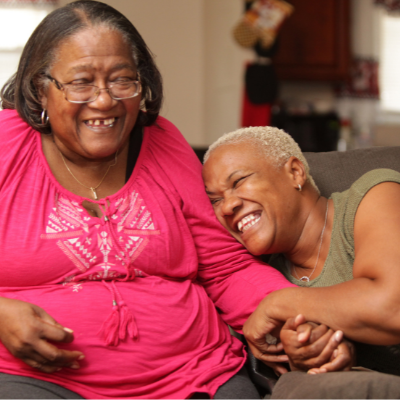
Council on Aging’s Caregiver Support Program offers one-on-one support, advice and resources to family and other informal caregivers to help them manage their caregiving responsibilities. And now, the program is also able to offer overnight respite care so caregivers can take a much-needed break.
If appropriate, this service will provide up to seven days (overnight) of care in an area care facility. All of the care recipient’s needs will be met while at the care facility. Caregivers are then free to use this time for respite – rest, catch up on housework or paperwork, visit out-of-town friends/family, take a vacation, etc.
Since overnight respite care was first offered in July, the service has supported 10 family caregivers in COA’s service region by providing 74 days of overnight respite.
“Caregivers give so much of themselves and often neglect their own needs when caring for a loved-one,” said Anna Goubeaux, RN, COA’s caregiver support nurse. “Caregiver burnout is one of the top reasons older adults and people with disabilities end up in nursing homes. Supporting caregivers and giving them much-needed time off benefits everyone.”
COA’s Caregiver Support Program is available at no cost to caregivers or care recipients aged 60 and older. The caregiver must live in Butler, Clermont, Clinton, Hamilton or Warren counties. There is no age requirement for family caregivers who provide care for individuals with Alzheimer’s disease or related disorders with neurological and organic brain dysfunction.
The overnight respite care is available to eligible caregivers of individuals who have a cognitive impairment (Alzheimer’s disease or dementia, for example).
Learn more at https://www.help4seniors.org/programs-services/caregiver-support.
Senior farmers’ market program nearly doubles participants in 2021
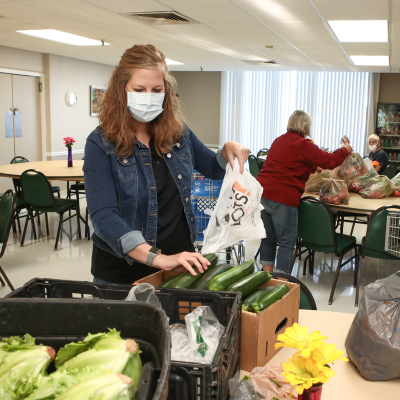
In its second year operating in southwestern Ohio, the United States Department of Agriculture Senior Farmers’ Market Nutrition Program nearly doubled in size, providing 2,213 low-income area older adults with fresh, local produce for no out-of-pocket cost. More than 100 Warren County older adults participated in the 2021 growing season, a 218 percent increase over the program’s first year.
Working with community members and the Ohio Department of Aging, Council on Aging brought the program to its service area for the first time in 2020. Despite the challenges and uncertainty posed by the early months of the COVID pandemic, more than 1,100 people participated in the program in its first year.
COA honors area home health aides as 2021 heroes
Home health aides provide critical and often life-saving care for older adults who want to remain in their homes as they age. In addition to providing personal care and assistance with everyday tasks, home health aides get to know their care recipients intimately and can be the first to notice critical changes in physical and behavioral health. In 2021, COA was pleased to recognize three local individuals as 2021 Home Health Aide Heroes. Read more…
ESP and family keep 97-year-old going
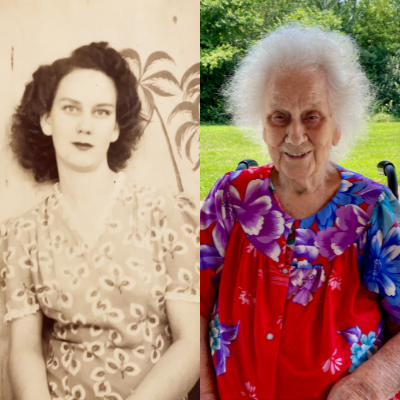
Family. That is what keeps Sylvia going. In her 97 years, she raised three children, is grandmother to five and “great grandma” to four.
In 1989, Sylvia became a widow when her husband, Alvis, died after 43 years of marriage. Sylvia has struggled with aging-related health, mobility and short-term memory issues, and the Warren County Elderly Services (ESP) is an important part of her support network.
Together, her tight-knit family and ESP have helped her to remain independent in her own home.
Not long after they married in 1946, Sylvia and Alvis built a brick ranch home in Carlisle where they raised their children, Janice, Phillip and Greg. Sylvia lives in that house today – some 70+ years later – now sharing it with her son, Phillip, who, because of his own health problems, provides much needed companionship for Sylvia, but little more. Sylvia misses his company when he travels to Tennessee to visit his daughter, Brittany, and she is grateful when her great-granddaughter stays with her while Phillip is gone.
Sylvia also misses attending her church, Baptist Tabernacle, where she was in charge of sending sympathy and get-well cards to members.
But Sylvia feels fortunate to have strong family support. All her children and extended family have a caregiving role, ranging from handling financial matters to visiting regularly. Sylvia’s daughter-in-law, Loretta, often takes her to get her haircut. And her nieces are making plans for her 100th birthday – motivating her to live to triple digits.
Even with their never-ending support, her family members can’t be with her constantly. She is grateful for ESP which fills in gaps in care the family is unable to provide.
Sylvia is quite particular about many things, especially cleaning and personal grooming. All has to be “just so.” Still, she allows her ESP aide to help her twice a week around the house, which is filled with her favorite color, red.
Even though she doesn’t cook for herself anymore, she enjoys the home-delivered meals brought to her each week. They remind her of the past, when a trip to Grandma Sylvia’s house most assuredly meant made-from-scratch biscuits and gravy, along with pinto beans and cornbread. Family members have tried, but they can’t seem to duplicate her recipes.
The most beneficial service she receives from ESP, according to her grandson, Tony, is an automated medication dispenser that alerts Sylvia when it’s time to take her medication – it even provides the correct dose. “It’s been a life-saver,” said Tony. “A few years ago, we almost lost her because she over-medicated herself.”
“I can’t imagine not having ESP services,” he added. “I don’t think she could live alone without those things. And it’s so important for us – her family – so we don’t feel guilty about not being able to be with her all the time.”
